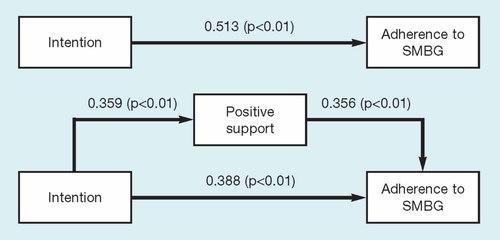下载PDF
{"title":"伴侣支持、社会认知变量及其在2型糖尿病患者坚持自我血糖监测中的作用","authors":"Dr Vera Costa, M Graça Pereira PhD, Susana Pedras MPsy","doi":"10.1002/edn.212","DOIUrl":null,"url":null,"abstract":"<p>In Portugal, diabetes affects 11.7% of the population, of whom about 90% have type 2 diabetes. Patients and their partners are affected and the latter have a direct impact on patients' adaptation to diabetes. A large proportion of patients, at diagnosis, have to readjust their daily routines in order to integrate self-care behaviours related to diabetes.</p><p>The goal of this study was to analyse the relationship among partner support, social-cognitive variables about self-monitoring of blood glucose (SMBG) (intentions, attitudes, subjective norms, perceived behaviour control, action planning and coping planning), adherence and glycaemic control in type 2 diabetes patients, diagnosed in the past 12 months.</p><p>A total of 179 people with diabetes participated in the study. The instruments used were: Multidimensional Diabetes Questionnaire; Revised Summary of Diabetes Self-Care Activities Scale; and Planned Behavior Questionnaire – Self-Monitoring of Blood Glucose. Glycaemic control was assessed by HbA<sub>1c</sub>.</p><p>The perception of positive support from partners and intention to perform SMBG predicted adherence to SMBG. Furthermore, positive support mediated the relationship between intention and adherence to SMBG. Positive and negative partner support were positively associated with intention, action and coping planning and adherence to SMBG. Good metabolic control was negatively associated with negative support.</p><p>The results show the importance of partners' support and social-cognitive variables, regarding self-monitoring of blood glucose, on patients' adherence. Copyright © 2012 FEND. Published by John Wiley & Sons, Ltd.</p>","PeriodicalId":100496,"journal":{"name":"European Diabetes Nursing","volume":"9 3","pages":"81-86"},"PeriodicalIF":0.0000,"publicationDate":"2012-12-05","publicationTypes":"Journal Article","fieldsOfStudy":null,"isOpenAccess":false,"openAccessPdf":"https://sci-hub-pdf.com/10.1002/edn.212","citationCount":"26","resultStr":"{\"title\":\"Partner support, social-cognitive variables and their role in adherence to self-monitoring of blood glucose in type 2 diabetes\",\"authors\":\"Dr Vera Costa, M Graça Pereira PhD, Susana Pedras MPsy\",\"doi\":\"10.1002/edn.212\",\"DOIUrl\":null,\"url\":null,\"abstract\":\"<p>In Portugal, diabetes affects 11.7% of the population, of whom about 90% have type 2 diabetes. Patients and their partners are affected and the latter have a direct impact on patients' adaptation to diabetes. A large proportion of patients, at diagnosis, have to readjust their daily routines in order to integrate self-care behaviours related to diabetes.</p><p>The goal of this study was to analyse the relationship among partner support, social-cognitive variables about self-monitoring of blood glucose (SMBG) (intentions, attitudes, subjective norms, perceived behaviour control, action planning and coping planning), adherence and glycaemic control in type 2 diabetes patients, diagnosed in the past 12 months.</p><p>A total of 179 people with diabetes participated in the study. The instruments used were: Multidimensional Diabetes Questionnaire; Revised Summary of Diabetes Self-Care Activities Scale; and Planned Behavior Questionnaire – Self-Monitoring of Blood Glucose. Glycaemic control was assessed by HbA<sub>1c</sub>.</p><p>The perception of positive support from partners and intention to perform SMBG predicted adherence to SMBG. Furthermore, positive support mediated the relationship between intention and adherence to SMBG. Positive and negative partner support were positively associated with intention, action and coping planning and adherence to SMBG. Good metabolic control was negatively associated with negative support.</p><p>The results show the importance of partners' support and social-cognitive variables, regarding self-monitoring of blood glucose, on patients' adherence. Copyright © 2012 FEND. Published by John Wiley & Sons, Ltd.</p>\",\"PeriodicalId\":100496,\"journal\":{\"name\":\"European Diabetes Nursing\",\"volume\":\"9 3\",\"pages\":\"81-86\"},\"PeriodicalIF\":0.0000,\"publicationDate\":\"2012-12-05\",\"publicationTypes\":\"Journal Article\",\"fieldsOfStudy\":null,\"isOpenAccess\":false,\"openAccessPdf\":\"https://sci-hub-pdf.com/10.1002/edn.212\",\"citationCount\":\"26\",\"resultStr\":null,\"platform\":\"Semanticscholar\",\"paperid\":null,\"PeriodicalName\":\"European Diabetes Nursing\",\"FirstCategoryId\":\"1085\",\"ListUrlMain\":\"https://onlinelibrary.wiley.com/doi/10.1002/edn.212\",\"RegionNum\":0,\"RegionCategory\":null,\"ArticlePicture\":[],\"TitleCN\":null,\"AbstractTextCN\":null,\"PMCID\":null,\"EPubDate\":\"\",\"PubModel\":\"\",\"JCR\":\"\",\"JCRName\":\"\",\"Score\":null,\"Total\":0}","platform":"Semanticscholar","paperid":null,"PeriodicalName":"European Diabetes Nursing","FirstCategoryId":"1085","ListUrlMain":"https://onlinelibrary.wiley.com/doi/10.1002/edn.212","RegionNum":0,"RegionCategory":null,"ArticlePicture":[],"TitleCN":null,"AbstractTextCN":null,"PMCID":null,"EPubDate":"","PubModel":"","JCR":"","JCRName":"","Score":null,"Total":0}
引用次数: 26
引用
批量引用
Partner support, social-cognitive variables and their role in adherence to self-monitoring of blood glucose in type 2 diabetes
In Portugal, diabetes affects 11.7% of the population, of whom about 90% have type 2 diabetes. Patients and their partners are affected and the latter have a direct impact on patients' adaptation to diabetes. A large proportion of patients, at diagnosis, have to readjust their daily routines in order to integrate self-care behaviours related to diabetes.
The goal of this study was to analyse the relationship among partner support, social-cognitive variables about self-monitoring of blood glucose (SMBG) (intentions, attitudes, subjective norms, perceived behaviour control, action planning and coping planning), adherence and glycaemic control in type 2 diabetes patients, diagnosed in the past 12 months.
A total of 179 people with diabetes participated in the study. The instruments used were: Multidimensional Diabetes Questionnaire; Revised Summary of Diabetes Self-Care Activities Scale; and Planned Behavior Questionnaire – Self-Monitoring of Blood Glucose. Glycaemic control was assessed by HbA1c .
The perception of positive support from partners and intention to perform SMBG predicted adherence to SMBG. Furthermore, positive support mediated the relationship between intention and adherence to SMBG. Positive and negative partner support were positively associated with intention, action and coping planning and adherence to SMBG. Good metabolic control was negatively associated with negative support.
The results show the importance of partners' support and social-cognitive variables, regarding self-monitoring of blood glucose, on patients' adherence. Copyright © 2012 FEND. Published by John Wiley & Sons, Ltd.


